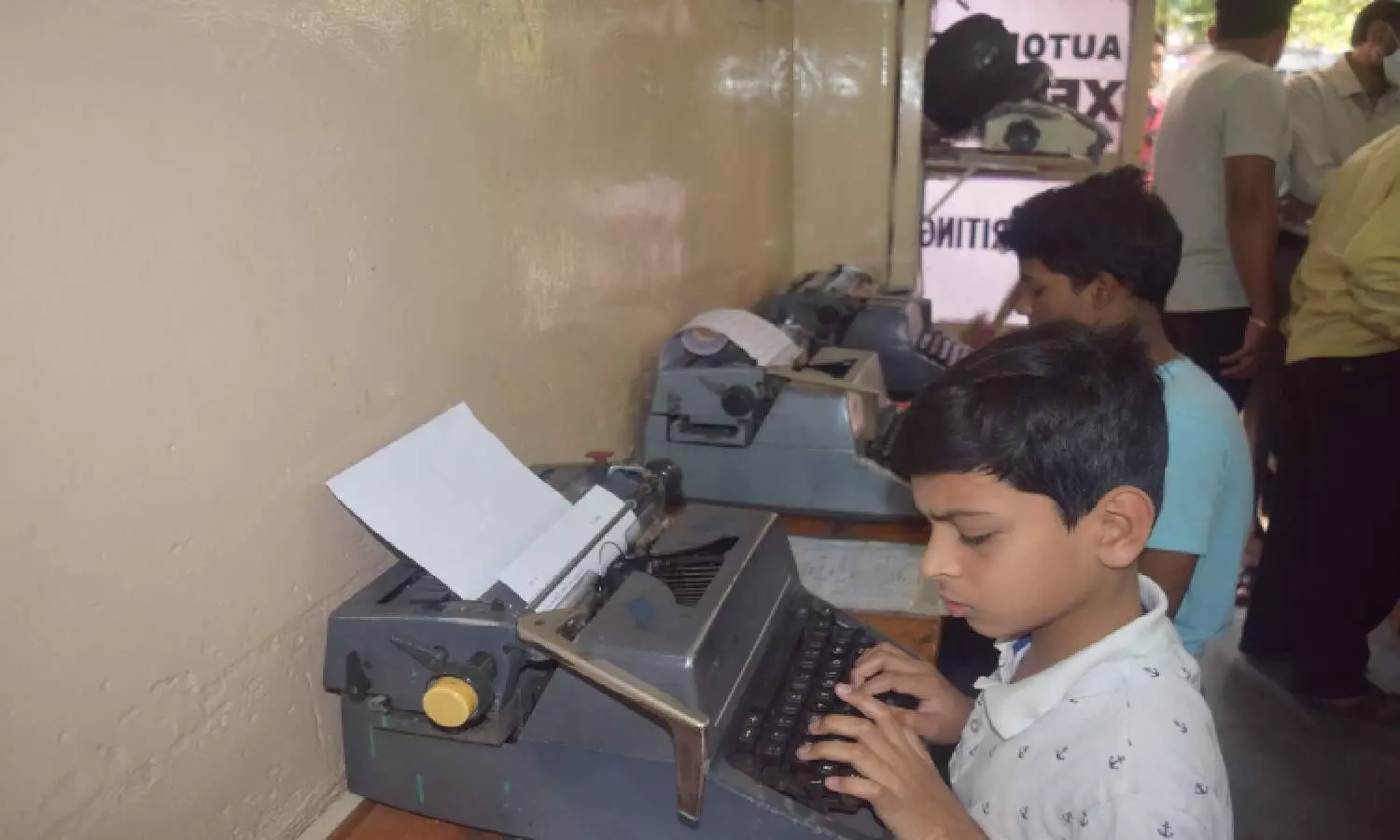Successive generations retype a bygone era in Azampura's 54-year-old typewriting institute
Like a typewriter that can't erase what's typed on a paper, Vishnu Typewriting Institute tries not to erase the memories of a bygone era by retyping it through its successive generations.
By Nimisha S Pradeep
Hyderabad: An 11-year-old boy looks at a worksheet and then turns to the typewriter in front of him. He types "g l a s s", pauses, and turns to look at the worksheet every now and then to ensure that he is typing it correctly. Amidst the echoes of the Asr prayers from the Sahifa Masjid in Chanderghat in Malakpet, the keys of a 10-year-old Godrej typewriter clatter rhythmically.
In 1985, Ravinder Reddy started running the Vishnu Typewriting Institute in Azampura, located hardly a kilometer from the Malakpet Metro station and around 400 metres from the Sahifa Masjid in Chanderghat. The institute, one of the oldest (54 years old) in Hyderabad, was started in 1967 by his uncle. Ravinder joined his uncle after completing his degree. For the last 37 years, Ravinder's days revolved around the rhythmic clattering of the typewriters' keys.
The institute opens at 9 a.m every day and closes around 9 p.m. Ravinder now has 30 students. Some of the students live around 10 km away, says Ravinder. "Yes, with the advent of computers and mobile phones, the number of students learning typewriting has reduced. Earlier, I used to keep registers, receipt books, and had the timings of each student written down on the notice board. But now, since the number of students has come down, I am not putting it up on the board," says Ravinder.
The institute has eight – all Godrej. "These were purchased 10 years ago replacing the Remingtons. Now both Remington and Godrej have stopped producing typewriters. We can no longer buy typewriters. Here we repair and use them," says Ravinder.
A typewriter also has a very low operating cost. Unlike computers, it doesn't need electricity. It just needs papers and ink ribbons that have to be changed once in 15 days. For children born in the computer era, a typewriter is really a thing of amusement. You place a paper and start typing. There is no power button!
Awaif, a student at the institute, keeps typing, hardly looking at the typewriter keys. His eyes are fixed on the worksheet. "In three months, you can type without looking at the keys," says Ravinder. At the Vishnu Typewriting Institute, there are two kinds of courses –a five-month course for the certification exam in typewriting and a three-month course to learn to type faster on a computer. The government conducts the certification exam twice a year in August and September. "During summer holidays, a lot of students enroll for the course," says Ravinder. Each student has to pay Rs. 800 but if they are facing financial hardships, Ravinder collects only Rs. 500.
In this age of computers, laptops, and mobile phones, one might wonder, why do students learn typewriting? Most of the students at Vishnu Typewriting Institute enroll for coaching for the government exams. "For government jobs, a certificate in typewriting is an added advantage. If you know typewriting, it is obvious that you will have good speed in typing on a computer," explains Ravinder.
That's exactly the second reason why students come to learn typewriting – to be able to type faster on computers. Since the keyboard of a computer and typewriter is the same, it's a great way to improve typing speed. Each student practices for an hour every day. "I have a computer at home. I am learning typewriting so that I can type faster on the computer," says Mohammed Ayan, another student.
Around 20 years ago, Ravinder bought a computer, printer, and a Xerox machine and started offering photocopying and printing services at the institute. Ravinder has used a typewriter for over 30 years but still, he says he prefers a computer to a typewriter. "Typing on a computer is much easier. You can delete words unlike on a typewriter where you can't erase anything. You have to take a new paper and retype the entire thing," says Ravinder.
The institute also has a 30-year-old typewriter of Olympia company. Ravinder holds the small suitcase containing the small typewriter and says, "This is a portable typewriter. We don't use it these days but it still works."
Twelve-year-old Ibrahim, meanwhile, goes from one student to another with a stern look on his face checking if they are typing correctly. An older boy gets up and shows his typed sheet to Ibrahim. Ibrahim, using his pen, circles the mistakes and returns the sheet. "He is the new master," says Ravinder. Ibrahim has been training for the last year.
Like a typewriter that can't erase what's typed on a paper, Vishnu Typewriting Institute tries not to erase the memories of a bygone era by retyping it through its successive generations.